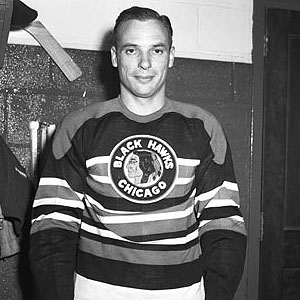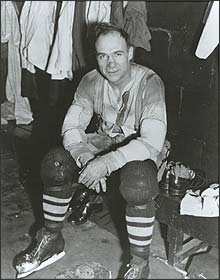The Amazing Conacher Brothers
When Roy Conacher was just five years old, his uncle Charlie took him to a Chicago Black Hawks game at Maple Leaf Gardens. Charlie Conacher was a legendary former Leaf and had seats right along the boards - fans sitting there would feel the lumber shake when a player was hit by a powerful check.
For Roy, this wasn't just any game. It was 1948 and the first time that the youngster had the opportunity to see his father - also named Roy - in action.
During the warmup, Roy Sr. skated over to the boards to chat with his son, causing a buzz in the neighbouring seats. The elder Conacher was having his best season in the NHL, one that would see him notch 68 points in just 60 games.
"That's when I realized how special and famous my Dad was," recalls Roy Conacher Jr., now a retired Kingston lawyer.
Of course, it wasn't just Roy Conacher who was special. Roy, Charlie and Lionel Conacher represent the only instance of three brothers being inducted into the Hockey Hall of Fame. And a fourth brother, Roy's twin Bert, was talented but his career was cut short by an eye injury.
And what a family it was. In the 1930s, Charlie starred for the Leafs on the Kid Line with Joe Primeau and Busher Jackson. He played in 328 NHL games, amassing an impressive total of 324 points. He was nicknamed the Big Bomber for his powerful shot.
Lionel was named Canada's greatest athlete of the half century in 1950 for excelling in a wide range of sports, including hockey, lacrosse and football. He skated in the NHL in the 1920s with the New York Americans, Montreal Maroons and other teams. Lionel led the Toronto Argonauts to Grey Cup victory in 1921, scoring 15 points in a 23-0 pounding of Edmonton.
Then there was Roy and his twin brother Bert. The pair were part of the 1936 Memorial Cup winning West Toronto Nationals. Unfortunately, Bert's professional aspirations were cut short when he lost an eye while playing road hockey with Charlie.
In 1938-39, Roy joined the Boston Bruins and led the league in scoring with 26 goals - a record for a rookie and one that would stand for 54 years. During three of his initial four seasons, he finished either first or second in the league goal-scoring race.
Roy helped the Bruins capture the Stanley Cup twice, scoring the Cup-winning goal in 1939 as Boston beat Toronto. Two years later, the Bruins defeated Detroit for the ultimate prize.
His brother Lionel had dominated the league in the 1920s; Charlie was equally strong in the following decade. Roy might have been the story of the 1940s were it not for the call of duty during the Second World War. In 1942, he volunteered for the Royal Canadian Air Force and served in both Canada and England. While he continued to play hockey with the military, it was not the same calibre as the NHL.
When Roy returned to Boston in 1946, he discovered that he was a couple of steps behind. He was traded to Detroit and then moved to Chicago. In the windy city, he found his skating legs again. Over the next five campaigns only three players amassed more points, Gordie Howe, Ted Lindsay and Rocket Richard - pretty good company.
By 1951, he was ready to retire. "He was pretty shy and didn't like being in the spotlight," his son recalls. "Like many players, he had a lot of butterflies before each game and got sick to his stomach."
There was brotherly love in the Conacher family, but there was hefty competition too. Charlie had notched 224 goals in the NHL. In the 1951-52 season, Roy returned for a handful of games so that he could top his brother - and he did with 226 goals. Only then did he hang up his skates.
The success of the Conacher brothers was all the more remarkable considering their humble beginnings. In the early part of the 20th Century, their parents struggled to support the family of five boys and five girls in downtown Toronto.
"I remember my father telling me that as a child he was sent out to scour the train tracks for coal that had fallen off a train and bring it home to put in the stove so they would have heat," Roy Conacher Jr. recalls.
After retiring from hockey, Roy became the manager of his brother Charlie's hotel in Toronto. Lionel went on to serve as a member of both the provincial legislature and as an MP in Ottawa. Tragically, he died of a sudden heart attack in 1954 while playing in a softball game on Parliament Hill.
Charlie was inducted into the Hockey Hall of Fame in 1961 - he died seven years later. Unfortunately, the Hall only recognized Roy and Lionel after their deaths.
As for Roy Conacher Jr., he played hockey as a youngster but quickly realized that he did not have the skills or drive to make the NHL. Rather than ride the buses in the minor leagues, he focused on education, graduating with a law degree from York University's Osgoode Hall.
He joined the legal rat race on Bay Street but quickly tired of burning the midnight oil - even on weekends. In 1973, he and a partner searched for an alternative and decided to move to Kingston. His practice grew quickly and he soon became one of the city's most successful lawyers.
With his own boys being involved in Kingston hockey, Roy coached and then became president of the Rotary-Kiwanis Hockey League. During the 1990s he served on the board of the Kingston hockey hall of fame, eventually taking on the role of president.
He had a vision that the Kingston Hall could work together with the International Ice Hockey Federation in Europe and the Hockey Hall of Fame in Toronto to promote the sport worldwide.
For a few years, the Kingston Hall served to house key artifacts from the IIHF. However, the organization eventually decided to establish its own facility in Zurich, which opened in 1997.
Conacher also wanted to cooperate with the Toronto hall. While the Kingston organization was modest, it did have something that the NHL wanted badly - the rights to the Hockey Hall of Fame name.
He hoped that the NHL deal would bring many hockey artifacts to the Kingston Hall - but it received little. "Unfortunately, we were bamboozled by the NHL," Conacher recalls. "I had the feeling when we were negotiating that the NHL simply wanted the Hockey Hall of Fame name. It turned out that was the case."
Roy Conacher Jr. is rightly proud of his family's incredible contribution to sport, the military, government and community organizations like the Original Hockey Hall of Fame. "Whether they were larger than life like my Uncle Lionel, more quiet like my father or a character like Charlie, they were pretty amazing."